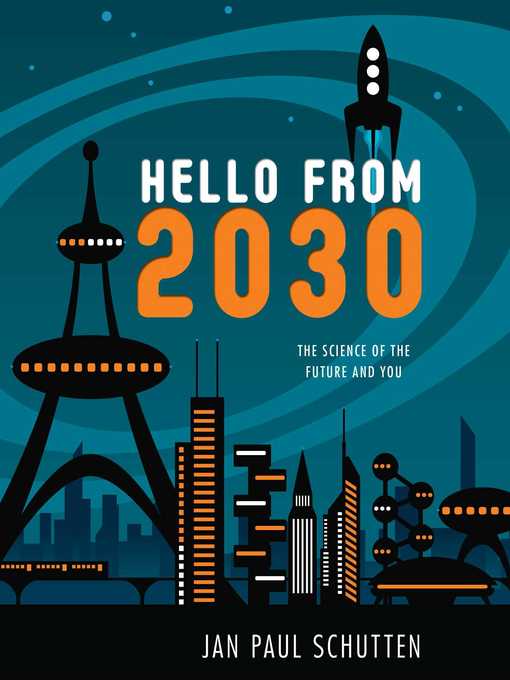
Hello from 2030
The Science of the Future and You
علم آینده و شما
فرمت کتاب
ebook
تاریخ انتشار
2014
Lexile Score
890
Reading Level
4-5
نویسنده
Jan Paul Schuttenناشر
Aladdin/Beyond Wordsشابک
9781481409469
کتاب های مرتبط
- اطلاعات
- نقد و بررسی
- دیدگاه کاربران
نقد و بررسی

August 11, 2014
Schutten offers a speculative guide that imagines idyllic and dire possibilities for life on Earth in 2030, contemplating the ways that home life, health, and the environment might change. Sobering thoughts about the loss of species (“Our kids call us crazy for how irresponsible we were with our world”) are tempered by exciting possibilities—for example, replacing one’s body with artificial components to prolong life indefinitely: “You’d still exist and think but, for the most part, be a robot.” Between the possibilities Schutten invokes and the many digital illustrations of imaginary futuristic tech, the book should leave readers wondering what their future might look like. Ages 8–12.

October 1, 2014
A Belgian import attempts prognostication. Schutten opens and closes with the dead-cinch prediction that readers in 2030 will laugh at his views on where household tech, sustainable land and water use, medicine and robotics are heading in the near future. In between, he delivers debatable prophecies that microwave ovens will be superseded by unspecified new devices, that computer games will replace most toys and like airy claims. These are embedded in equally superficial surveys of the pros and cons of fossil and alternative energy sources, as well as cautionary looks at environmentally damaging agricultural and lifestyle practices that are in at least the early stages of being addressed. Conversely, he is blindly optimistic about the wonders of "superfoods," carrying surveillance chips in our bodies and supersmart robots managing our lives. Uncaptioned photos and graphics add lots of color but little content. A closing section of provocative questions, plus endnotes citing news stories, blog posts and other sources of more detailed information, may give would-be futurologists some reward for slogging their ways through. Readers who want to know when their jet packs and food tablets will be coming will find no answers in this mishmash of eco-sermons and vague allusions to cutting-edge technology. (index) (Nonfiction. 10-12)
COPYRIGHT(2014) Kirkus Reviews, ALL RIGHTS RESERVED.

November 1, 2014
Gr 5 Up-Ever wonder what food we'll be eating in 15 years? How about what kind of cars we'll drive or where our energy sources will come from? Schutten isn't quite sure, either, but he knows enough about the scientific trends to make some fair guesses in this introduction to science forecasting for the 21st century. Basing his assumptions on Moore's Law (which states that computer processing power doubles every two years), Schutten hypothesizes that other facets of the scientific world work the same way. In each chapter, Schutten discusses a different area of science, including space, energy, food, health, and robotics, and he covers the growing concerns that affect each issue. His views on negative human influences over the environment, from the proliferation of plastic to the overfishing of our waters, is evident but never overwhelming. Robot lovers will enjoy the "Age of the Robot," a chapter where futuristic cars, robosoldiers, and other gadgets are discussed. Some will find the design (featuring sections that are merely a page long) distracting, but more impatient readers may find this format quite enjoyable and engaging. Colorful graphics are included and pair nicely with the text. This book will spark discussion. Hand it to a science lover, and watch the conversation flow.-Keith Klang, Port Washington Public Library, NY
Copyright 2014 School Library Journal, LLC Used with permission.

December 1, 2014
Grades 4-7 Books about the future can often be scary or apocalyptic. Schutten asserts that the future is nothing to fear and that while 2030 might present some daunting challenges, what happens is largely within our control in the present. He highlights the potential for longer and healthier lives, faster technology, and smarter homes. Yet the book retains a cautionary tone regarding environmental issues like water usage and energy consumption. A chapter is included on the burgeoning field of futurology and the process of making good predictions. Each chapter is prefaced by a note from 2030 with guesses based on reliable data, but Schutten acknowledges that many of the book's predictions will be laughably wrong. Extremely detailed source notes for each chapter draw on current research and news articles and include links to further reading. The engaging text is supported by plenty of full-color visuals presented in a dynamic format. Presenting an overwhelmingly optimistic outlook on the future, the book reminds us that we might as well welcome change with open arms.(Reprinted with permission of Booklist, copyright 2014, American Library Association.)

























دیدگاه کاربران